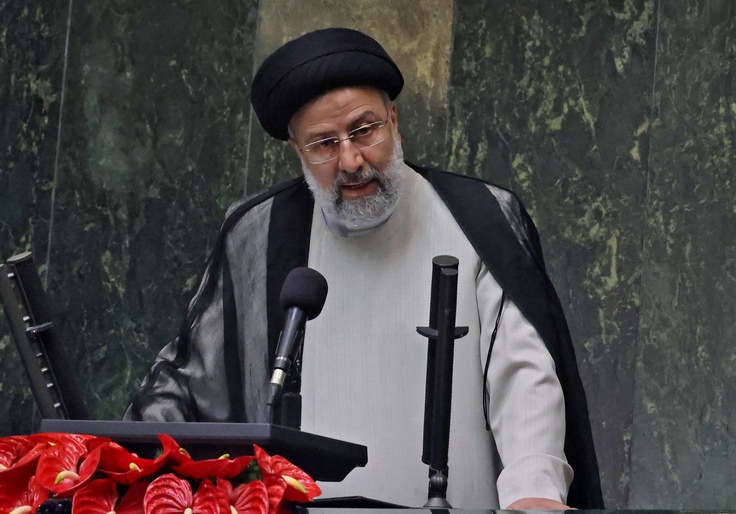Emboldened Iran To Hold War Drills With Russia and China

Iran is set to hold a series of war drills with Russia and China, as the hardline regime celebrates the United States' bungled evacuation in Afghanistan and boosts its enrichment of nuclear weapons-grade uranium to historically high levels.
Iranian and Russian leaders announced on Monday that their countries, along with China, will hold joint maritime war exercises in the Persian Gulf later this year or early in 2022, according to Iran’s state-controlled media. The countries said they will focus on "shipping security and combating piracy" as the United States reduces its military footprint in the region following its marred withdrawal from Afghanistan.
The announcement comes as the rogue countries step up their involvement in war-torn Afghanistan amid a hurried effort by the Biden administration to evacuate U.S. personnel from the country. Iran, Russia, and China have all expressed an interest in replacing the United States as a powerbroker in the nation and working with the newly installed Taliban government. Iran's foreign ministry announced that "Iran is in contact with all parties in Afghanistan to pave the ground for dialogue and reconciliation" and that the Russian and Chinese embassies remain functioning.
Iran's new hardline president, Ebrahim Raisi, celebrated what he called America's "military failure" in Afghanistan last week, saying the Biden administration's "military defeat and its withdrawal must become an opportunity to restore life, security, and durable peace in Afghanistan." Iranian officials also have sought to increase ties with the Taliban, historically a regional enemy, as it expands its footprint in the region.
As the situation in Afghanistan deteriorates for the United States, Iran has increased its enrichment of uranium, the key component in a nuclear weapon. The International Atomic Energy Agency reportedlate last week that Iran produced uranium metals that were enriched up to 20 percent purity for the first time in its history. It also amped up its uranium enrichment program to 60 percent purity, a threshold level that allows the regime to produce the fuel needed for a nuclear weapon.
The move was met with consternation by the United States and its European allies, but they did not take any steps to sanction Iran or issue penalties for its breach of the 2015 nuclear accord. The United States said Iran must cease its enrichment, but would not go further than a public reproach. France, Germany, and the United Kingdom also acknowledged their concerns on the IAEA report in a joint statement on Thursday.
Behnam Ben Taleblu, an Iran expert at the Foundation for Defense of Democracies, told the Washington Free Beacon that "the botched Afghanistan drawdown is a propaganda coup for Tehran."
The Islamic Republic "has long advanced the idea that America can be forced from the region through a sustained death-by-a-thousand-cuts military strategy," Taleblu said. "Moreover, it is trying to get local actors who are pro-American to accommodate rising Iranian power by saying those who work with Washington will one day be abandoned."
Iran's latest enrichment levels are a signal to the U.S. administration that the country "is increasingly comfortable with escalation and has survived peak pressure," Taleblu said. "Would you be afraid of a state which has denigrated instruments of national power like economic sanctions and military force in a bid to change your national security policy?"
As Iran increases its regional footprint and funds terrorist groups operating in and around Afghanistan, the Biden administration is pursuing negotiations aimed at securing a revamped nuclear agreement.
The State Department has made clear that it remains open to talks even as Iran refuses to come back to the bargaining table. Tehran wants full-scale sanctions relief and access to hard currency, but claims the Biden administration is not going far enough in its concessions, which are rumored to include the removal of sanctions on Iran’s financial system and other sources of revenue for the regime.
U.S. Iran envoy Robert Malley said last week the Biden administration is prepared to present Iran with a new nuclear deal should talks on reentering the 2015 accord fall apart, accordingto Politico.
Iran recently enlisted U.S. ally Japan in its pursuit of sanctions relief. Japanese foreign minister Toshimitsu Motegi landed in Tehran over the weekend to discuss ways both countries can pressure the Biden administration into granting Iran sanctions relief.
"To revive the [nuclear deal], the United States must abandon its excessive demands," Motegi was quoted as saying following meetings with high-ranking Iranian government officials.
